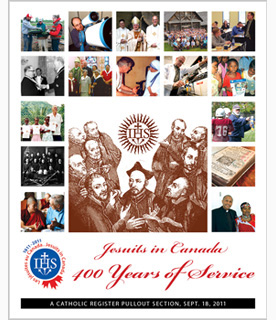As a novice, the young Jesuit makes the “closed retreat” — the full Exercises over 30 days, in silence. Most often, he is preparing to “make an election,” that is, to choose (or not) to follow Christ as a Jesuit. This is the classic mode of the Exercises, when one prays them in order to make a choice regarding one’s way of life.
Though it is not so for everyone, my own experience of this time of prayer as a novice was stormy. I experienced dramatic swings between what Ignatius calls consolation and desolation. It was precisely in this movement back and forth — from times of great zeal and desire to serve the Lord to times of lukewarmness and doubt — that I began to learn the very particular taste and touch of God’s grace in my life.
God brings each of us to a profound freedom and interior peace in the way that is most appropriate and most fruitful for us. In the Exercises, I met Jesus of Nazareth who chose me as His companion and gave me the “companions in the Lord” with whom He sends me on mission. By the end of the Spiritual Exercises, it was clear that I would remain in the Society of Jesus “to spend my life in it.”
After the novitiate, every Jesuit makes an annual retreat based on the movements of the Exercises. This eight-day retreat does not usually lead to a new election. It is much more often in the mode of making “amendment and reformation of one’s way of life.” As practical issues of Jesuit living come to the fore, the Spiritual Exercises offer an opportunity to come to Jesus who offers liberation, healing, reconciliation, forgiveness, joy, peace and rest.
As years go by, the warp and weft of the Spiritual Exercises become the very fabric of our perception of the world. I remember noticing one day, just as I was beginning my theology studies, that I was interpreting a particular event in light of the “Two Standards,” a key meditation of the second week of the Exercises. Slowly, subtly, the charism of Ignatius had become the template whereby I could understand my own ministry in the Church — indeed, my own life.
Before he is invited to make final profession, a dozen years or so after the novitiate and first vows every Jesuit is sent for a period of six to 12 months known as tertianship. During this time, we are given the opportunity to once again make the full, 30-day Exercises. This time, however, the Exercises open us up to a new encounter with God.
St. Ignatius called the Spiritual Exercises as experienced in tertianship the “schola affectus” — the school of the heart. We are no longer choosing a way of life. We are discovering, to our amazement, how lovingly and faithfully God has confirmed our initial election by showering us over and over again with particular gifts of His love. God has laboured to bring us to this point.
This is a time of union with God, a time of peace and great gratitude. My own experience of this time was profoundly transformative. I returned from the Exercises of tertianship with the unshakeable knowledge that I am a beloved son in the image of the Beloved Son, conscious of a new and enduring intimacy between Christ and myself.
Such is the gift of the Spiritual Exercises in the life of a Jesuit. It is because of this gift that Ignatius was confident that Jesuits could be religious at the heart of the world, without cloister walls. He knew that the Exercises create a cloister of the heart that enables each Jesuit to be “contemplative also in action,” and to praise, reverence and serve God in all things, ad maiorem Dei gloriam.
(Fr. Gilles Mongeau, S.J., is associate professor of systematic theology at Regis College in Toronto.)
Finding Jesus through Loyola’s Spiritual Exercises
By Fr. Gilles Mongeau, S.J., Catholic Register SpecialI was 21 years old and I had come to the Jesuit novitiate in Guelph, Ont., for all the wrong reasons. Barely four months into the novitiate, I was ready to pack my bags and go home. But the novice master wisely said: “Why don’t you wait until the Spiritual Exercises in January? See what God has to say about all this.”
The little text of the Spiritual Exercises — formally approved by Pope Paul III in 1548 after many years of crafting and recrafting by St. Ignatius Loyola — proposes a spiritual journey through the mysteries of salvation and Christ’s life. By imagining themselves into the life, death and resurrection of Jesus, St. Ignatius believed retreatants would become free of all disordered attachments, “so that rid of them one might seek and find the divine will with regard to the disposing of one’s life for salvation.”
The Exercises can be made by anyone. St. Ignatius was a lay man when he first conceived the Spiritual Exercises and lay people have been making Ignatian retreats ever since. But they occupy a central role in the life and spiritual development of every Jesuit.
Please support The Catholic Register
Unlike many media companies, The Catholic Register has never charged readers for access to the news and information on our website. We want to keep our award-winning journalism as widely available as possible. But we need your help.
For more than 125 years, The Register has been a trusted source of faith-based journalism. By making even a small donation you help ensure our future as an important voice in the Catholic Church. If you support the mission of Catholic journalism, please donate today. Thank you.
DONATE
